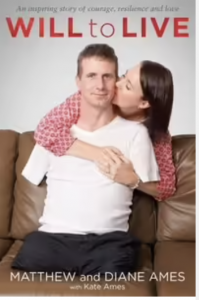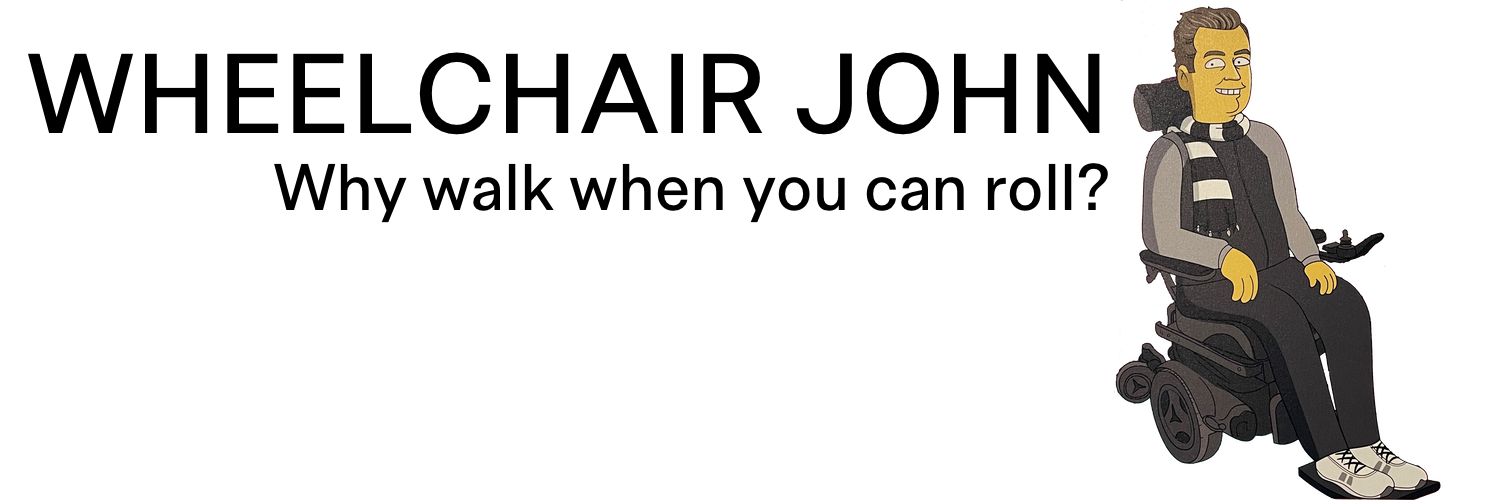Will to Live by Matthew and Diane Ames – a book summary
I’ve read a few books about living with a disability, and some of my blogs will share a summary of each book. If you like the summary, please buy the book and read it. This review is for Will to Live – Matthew and Diane Ames.
 Will to Live by Matthew and Diane Ames – Kindle edition on Amazon.com.au
Will to Live by Matthew and Diane Ames – Kindle edition on Amazon.com.au
Will to Live by Matthew and Diane Ames Book on Booktopia.com.au
- To appreciate when life is easy, you first have to know how hard it can be.
- I knew he was fighting for life for us. I knew he wanted to be here with us, and he was being so strong. I could not have loved him more at that moment.
- Our children, though this event, were losing some of their childhood.
- The medical staff helped with the entertainment – surgical gloves became balloons, nurses would tell jokes.
- Diane, think of the childhood he would have lost if Matthew actually died.
- It’s a dream, but i feels real and I know something is happening to me. At other times, I dream of gliding across the ground, fig trees, international hospitals and alien pods. My body’s asleep, but my mind is firing.
- I felt physically trapped.
- I was aware of the presence of other people and I could hear machines whirring.
- My brain was telling me that my limbs were still there.
- I needed to understand what was attached to me and what the attachments were doing.
- Each morning, a small conference would be held at the end of my bed, and I would try to overhear what they were saying.
- As I was breathing, I would start to gurgle and a nurse would have to put an instrument through the tracheostomy that went down into my lungs and suction them out.
- Medical staff had to change my nasal feeding tube a few times, which was horrible.
- My brain was playing tricks on me, and I often felt very disoriented.
- My dreams continued once I had woken, and to this day I can still picture many of them as clearly as if they had occurred last night.
- My bed in ICU was directly in front of the main nursing station, so there was a sense of busyness around me. I found it difficult to sleep – the incessant beeping and general noise was at times overwhelming.
- The nurses tended to focus on the immediate task at hand. They told me what they were doing while they were doing it, but not much more than that.
- I wasn’t hungry, but had a desperate desire to taste food and drink.
- It was beautiful to feel the wind on my face, and just that little bit of rain.
- Temperature control was an issue, as my body was unable to regulate itself.
- I found it was better to focus on acceptance and choose what I was then going to do.
- So I needed to start moving, despite the difficulties involved. I had to learn how to move.
- I had been stripped bare in every sense – emotionally and physically – and I needed my family to get me through that tough time. They would support me, but they would also be honest with me – they challenged me to get better and wouldn’t accept anything other than progress.
- This was to be my new home away from home, possibly fro up to a year, although I was pretty determined that I would be home much sooner.
- From the day of my admission, there was a routine to follow, and this meant life was very busy.
- Kate had introduced the kids to Nick Vujicic via youtube only a few days after they learned about my limbs being amputated. Nick’s motto of “No Arms, No Legs, No Worries”, gave the children and Diane great comfort.
- Sometimes you just have to be a bit assertive to make sure you stay safe and get what you need to do so. I had to be confident in letting people know what I wanted or needed.
- Everything I did would involve more risk than a normal person would take. With every moment, I was thinking “What can go wrong? How can I prevent it”. But I also knew it was imperative that I did take calculated risks because otherwise I wouldn’t improve.
- My ability to get aerobic exercise is compromised because I don’t have any large muscles – most people would use their legs to get most of their aerobic workout.
- I had always been aware that if I started to compare myself to others, there would always be someone who seemed to be better or worse off, and in rehab I was able to meet a lot of people who had been dealt a rough hand in life. It because evident how different people chose to respond to what happened to them, and one day I found myself pondering the fact that the pool of people worse off than me was now smaller.
- It reminded me that I’m not a terminal case – I still have life ahead of me no matter how difficult what might be, so as far as I’m concerned, I’m lucky.
- I was conscious that some of my friends were very nervous about seeing me in my new state. It seemed reasonable to me that they were thinking that way.
- I have to really think ahead, about everything.
- For the first time in my life, I noticed that footpaths aren’t as smooth as they look. I also noticed that how many shops had very small steps that prevented me from getting inside. If I wanted to buy something, I would frequently have to stay on the footpath outside the shop while someone went in to buy whatever it was we might have wanted, such as a coffee.
- I needed to negotiate, and survive, footpaths, pedestrians and cyclists, and some crazy people and their driving.
- Fortunately, Qantas has been fantastic – and they don’t really need to be, as I don’t have a choice of who to fly with. The way they deal with my special needs is also compassionate and respectful. in a sometimes difficult life, those things make a difference.
- Oscar Pistorius’s performance at the London Olympics had raised the profile of disabled athletes and questions about disability in general.
- I was learning that success in my new life is all about logistics.
- I had to be very clear and direct about where people should put things, which made it much easier for everyone else.
- I didn’t want to have to search mentally for things, because as time was progressing, I was starting to worry about not feeling clear in my head.
- I wanted the clarity I remembered back.
- Dianne had asked the hotel whether we could get the wheelchair into the room, and they said yes, but actually we couldn’t – we needed a ramp to get into it.
- Dianne and I were learning that the acquisition of a disability brings with it an unexpected burden of paperwork. Life was now all about classifications, eligibility and access.
- The first thing I do is try to recognise that I’m sad. I don’t let myself dwell on the feeling. I think there’s a difference between acknowledging and dwelling on something.
- As an able-bodied person, it never occurred to me how much effort it took for people with a disability to simply get out of the house.
- I have already spent too many hours of this life lying on my back staring at a ceiling.
- I knew I had been replaced instantly – no now is indispensable, and as a manager I was acutely aware that ultimately, things will go on without you.
- It is one thing to have an idea of what you need and want. It’s another to be able to fund it.
- We know this because we had worked hard and made good decisions, but we also know that had it been the other way around – if this had happened to Dianne – we would have been faced with selling our house, and possibly bankruptcy, just to survive because we had not foreseen the scale of what can go wrong.
- I am blown away that you love me so much and have been by my side through all of this. My love for her and what she has done at times completely overwhelms me.
- We knew that while lots of people had prayed for me to live, some had not. Some of our friends have told us that, and that’s fine.
- What’s unique about me and other people who have survived a near-death experience and gone on to prosper is that we’ve entered a ‘second phase’ of our lives.
- In the course of daily life prior to my amputations, my priorities slipped at times. I was a father, an employee, a husband, a son and a brother, probably in that order. I worked long hours and focused my attention on Dianne and the kids whenever I could.
- A few people with acquired disabilities have mentioned that they get to a place where they wouldn’t change what happened to them, that more positives have come from their experience than negatives.
- Dianne and I understand that the children’s lives are no harder than they would have been and that there will be things I may not be able to do with them in the the future, such as kick a ball on a beach, or go walking in the rain.
- Diane and I work every day to lighten any possible burden on the children, but we know in a way they will be better people because of what’s happened to me. They’ll have empathy with others worse off than them.
- They’ll know the importance of asking for help when it’s needed, but also that it’s a good idea to try things for themselves at the start.
- They’ll know that while declarations of love and commitment are great, words along are not enough, and action is everything.
- They’ll also know not to feel sorry for someone with a disability – yes, life may be harder, but that doesn’t mean it’s worse. And they’ll be the first to offer a helping hand to someone else.
- They’ll know that what you can achieve as an individual is nothing compared to what can be achieved as a team.
- They will be able to see all that is good in the world, rather than focus on that which is not.
Please read the book ‘Will to live’ – Matthew Diane Ames . Click here for information about the blog WheelchairJohn. More information about me is found at johnduthie.com
